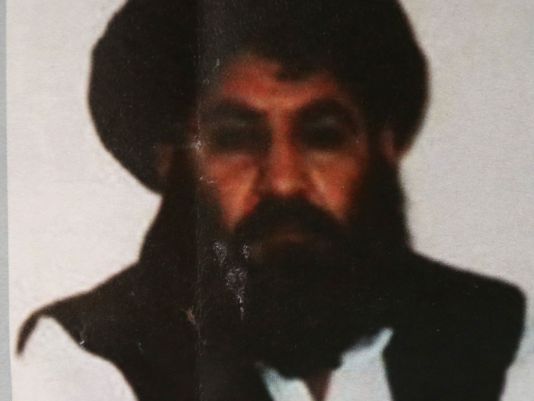First Take: Taliban leader’s death may not reduce war

The apparent death of Taliban leader Mullah Mansoor on Saturday won’t have an immediate impact on the military operations of the insurgent group, which has been expanding in recent months, analysts and Afghan government officials said.
“The political leadership does not really impact the military operations,” said Said Jawad, the senior foreign policy adviser for Abdullah Abdullah, Afghanistan’s senior executive. Still, Jawad described the U.S. strike on Mansoor as “good news.”
Mansoor was not a major leader firmly in control of the Taliban, analysts said.
“He was not a leader like Mullah Omar,” Jawad said, referring to the longtime leader of the group. “He was not fully established yet.
The Pentagon said it targeted Mansoor in an airstrike Saturday. In a statement, the Pentagon said it was still assessing the impact of the strike, but an official said it was likely Mansoor had been killed. The official was not authorized to discuss the strike.
Mansoor surfaced as the leader of the Taliban a year ago after it was revealed that Omar had died, probably a couple of years earlier.
The confusion at the top ranks of the Taliban hasn’t had much of an impact on the group’s military operations and it is not likely Mansoor’s death would, analysts say.
Targeting Mansoor is a positive development but won’t likely have a dramatic impact on the course of the war in Afghanistan, said Michael O’Hanlon, an analyst at the Brookings Institution.
“Well-established organizations that are large with multiple key leaders can often survive the death of key leader,” O’Hanlon said.
The U.S. military presence in Afghanistan has been shrinking in recent years as Afghan security forces have taken the lead in fighting the Taliban, who ruled Afghanistan before being driven from power by a U.S.-led coalition after the Sept. 11, 2001, terrorist attacks.
Less than 10,000 U.S. forces remain in Afghanistan, mainly in the role of advising and supporting Afghan security forces.
The Afghan government remains in control of most of the country, but Taliban fighters have gained in strength in parts of the south and north recently, severely testing the country’s new armed forces.
Afghanistan's president, Ashraf Ghani, has expressed interest in holding peace talks with the Taliban, under certain conditions, but the talks so far have foundered.
John Campbell, an Army four-star general who recently retired after serving as the top coalition commander in Afghanistan, said the death of Mansoor may provide the Taliban with an opportunity to pursue a peaceful solution. Mansoor was only interested in fighting and had not explored political solutions.
"Hopefully, the (Taliban) will move forward and engage with the national unity government and work toward a political solution and a more stable Afghanistan," Campbell said in an email.
But analysts are skeptical that Mansoor's death would revive peace talks and say his death could even heighten tensions between rival groups.
The rivalry could prompt factions to compete against each other to see who could launch the largest attacks, leading to even more violence, O’Hanlon said.
Still, his death might help to wear at the morale of the organization, which has suffered a number of setbacks over the years.
“You hope at some point the morale begins to suffer because of the setbacks,” O’Hanlon said,
Campbell said Mansoor's death would be welcome news for Afghan civilians and security forces who have been fighting the Taliban for years.
"I'm sure the people of Afghanistan and the Afghan security forces are pleased because Mullah Mansoor was responsible for many deaths of innocent Afghan civilians and Army/police," Campbell said,
Политика конфиденциальности | Правила пользования сайтом







